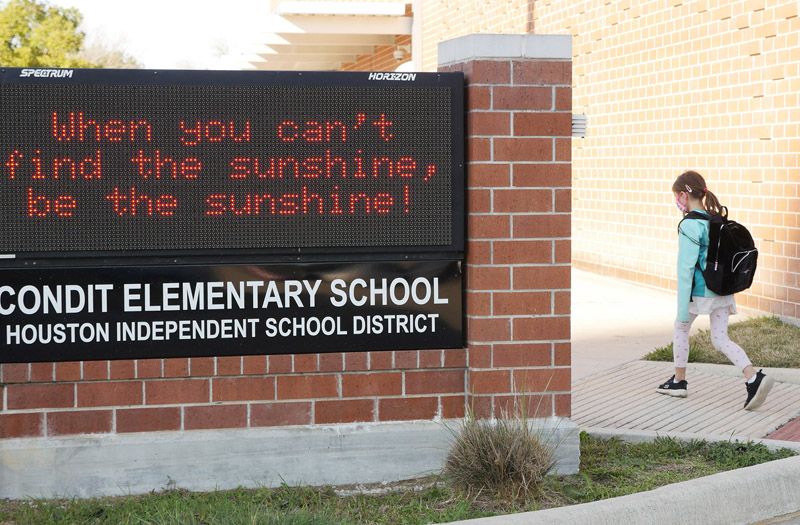
HOUSTON: The coronavirus pandemic may be raging in the Houston area, but tens of thousands of students in one district are headed back to the classroom in January because of poor results while learning from home. The plight of the town of Pasadena is being repeated across America, as educators fret that online learning for children because of the health crisis simply might not work.
Until now families in Pasadena could choose between sending their kids to school or keeping them home for remote learning. Nearly half of the nearly 50,000 students in the school district, from kindergarten to high school, stayed home. But their test results after the autumn period of school were disappointing - 40 percent failed at least one subject, compared to 18 percent of those who attended class in person.
In the 2019-2020 school year, that proportion was 13 percent for all the district's students. "Both groups are worrying me as far as their ability to get the curriculum basics successfully. But those virtual kids, that's something that we're concerned about at this time," said DeeAnn Powell, superintendent of the Pasadena Independent School District. That district covers a small part of Houston itself, plus the towns of South Houston and Pasadena, which are overwhelmingly Latino.
Powell says the pandemic has made life worse for this already economically challenged demographic. "Our kids of course are majority low-income," she said in an interview via Zoom. "When both parents are working, they are less likely to stay home and monitor that the kids are engaged," said Powell. "So I think it is a struggle."
"Sometimes, we find that because of safety reasons the kids aren't left at home. They might be taken to work with their parents or taken to run errands or engaged in different activities during the day and that's keeping them away from their assignments," said Powell. And some adolescents have simply dropped out of school and taken jobs in supermarkets or fast-food restaurants. To help the poorest families, the districts provides computers and pays for their Internet.
But the real problem is getting kids engaged in their classes. "I'm gonna be real honest. Sleeping in and doing school in your pajamas is easier than getting dressed every day for a day's work at school," said Powell. Other school districts in the Houston area have already halted online learning. Others reserve the option, but only for kids with medical reasons to stay home or who get good grades.
In Houston itself, the fourth largest city in the US, parents can still opt for online learning for their children. As agreed with his parents, one 15-year-old named Lucas Donalson is preparing -unenthusiastically - to go back to in person class in January, even if the pandemic is pushing hospitals back to overstretched levels seen during in the summer. "I don't think that my safety would have any harm going back to school because we are all six feet apart and I'm already seeing my friends right now," said Lucas.
Schools are taking precautions, with mandatory wearing of masks, social distancing, readily available hand sanitizer and regular cleaning of school facilities. Lucas admits he did not turn in all of his homework assignments on time while taking his classes online.
But he says teachers are partly to blame - some are not good at working with computers and communicating with students online. "In online school, some of my friends did miss some assignments just because there wasn't anyone to tell them 'you got to do this,' any bells to tell them it's time to switch classes," said Lucas. "They sort of fell asleep at the end of the class." - AFP

